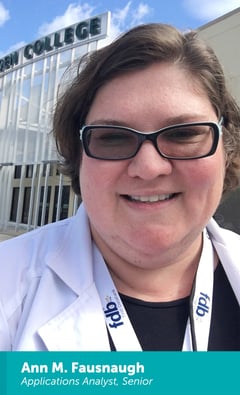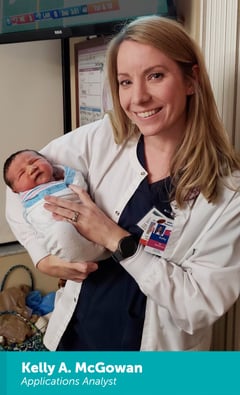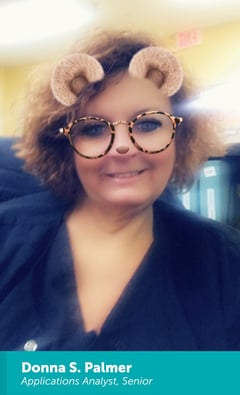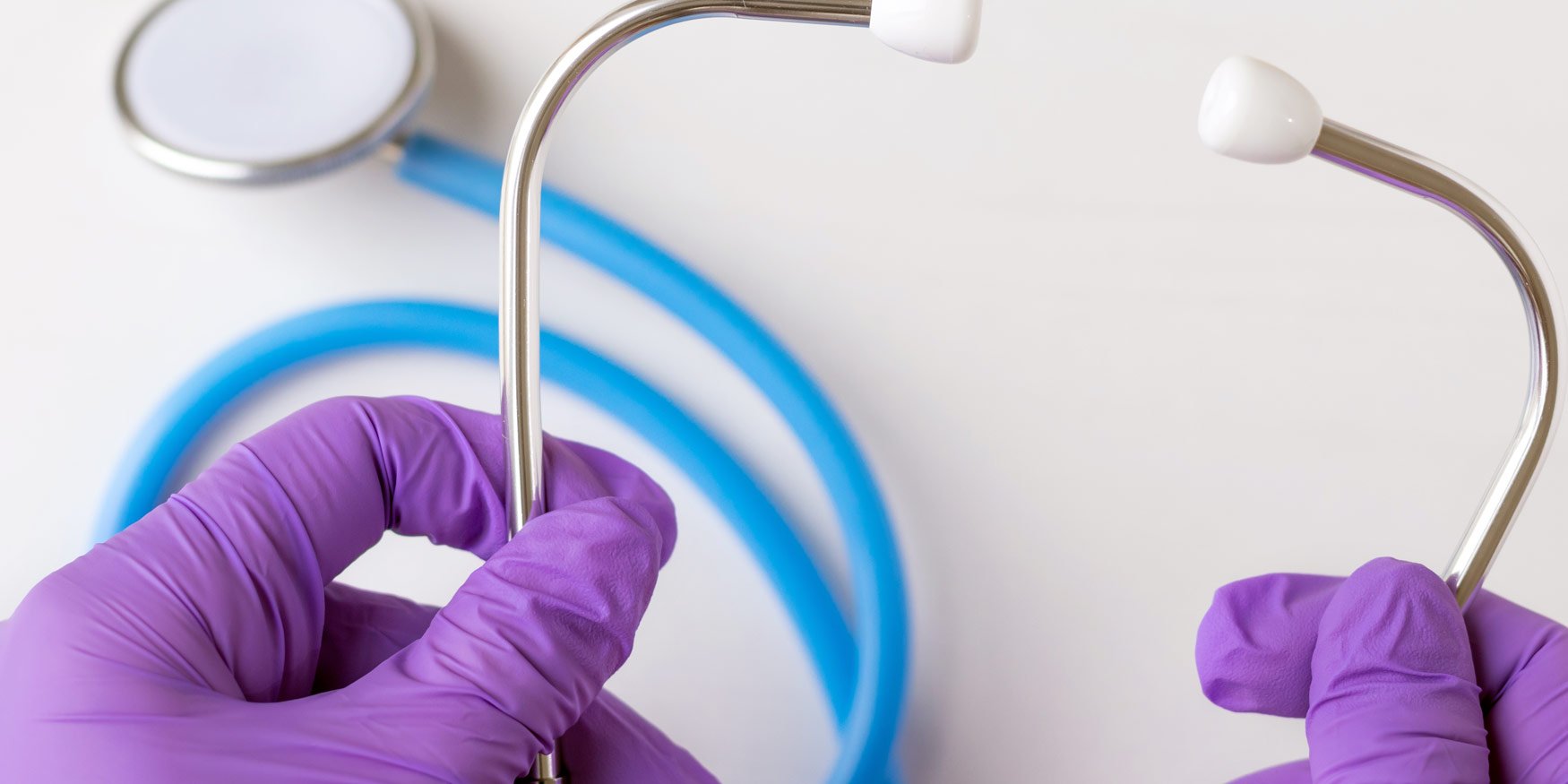A KEY DIFFERENTIATOR FOR JUNO IS THAT WE’RE USING REAL-WORLD INSIGHT GLEANED FROM ACTUAL CLINICIANS TO BUILD OUR EHR.
 That insight is integral to the changes we’re implementing and it’s a big reason why it’s so important for our nurses-turned-employees, like Ann, to attend events like HIMSS.
That insight is integral to the changes we’re implementing and it’s a big reason why it’s so important for our nurses-turned-employees, like Ann, to attend events like HIMSS.
Ann has spent nearly 10 years in healthcare IT, half of that time split with clinical nursing. She came into HIT almost by accident, having been on the front lines of the switch from paper charting to electronic health records. We caught up with Ann after HIMSS to get her take on the event and what excites her about the future of Juno EHR in the healthcare IT space.
Q: WHAT HAVE BEEN THE EFFECTS – POSITIVE AND NEGATIVE – OF EHRS IN THE ER/CRITICAL CARE?
When I started in the ER, we were on paper. My CNO asked for help to configure, build order sets, and train the physicians on CPOE. There was little to no training provided to me to achieve this task, but I had a tremendous amount of support from leadership which was essential to achieve a successful go-live. When we switched from paper to electronic, some big changes I noticed is that it did, in some respects, slow down the care. There was a wait time for certain things to get processed. But it also made certain things safer for patients: allergy checks, med checks, someone actually signing off on timing, there’s more accountability, honesty, double-checking, etc. Overall, I think EHRs have been a positive for patient care in the ER. Over time, care has gotten faster and functionality like multiple logins has helped with the teamwork aspect.
Q: WITH EACH SYSTEM BEING CUSTOMIZABLE, WHAT ABOUT STANDARDIZATION? ARE WE CATCHING EVERYTHING THAT NEEDS TO BE CAPTURED?
We do have standardization, and as a team we’re all doing configuration and we’re identifying templates to ensure things like ONC standards and core measure requirements are being met. Those types of templates are being flagged as required fields. Along with that, we’re streamlining vocabulary and the build process.
Q: WHAT WAS THE BUZZ INSIDE YOUR BOOTH AT HIMSS? WHAT FEEDBACK WERE YOU GETTING FROM DOCTORS, NURSES, ETC.?
No matter where I do a demo of Juno, the configuration aspect is drool worthy. You can decide what needs to change and when that change needs to be released. Anyone on the informatics side will appreciate this feature. We don’t have that coding background or that technical background. We have a user background and need to be able to make changes based on what makes sense to us. Our version of fixing something is just “click a button”; it should be that easy. So that’s what we’re working toward with Juno EHR.
Q: WHAT STICKS OUT FOR CLINICAL EXPERIENCES IN 2022?
My goal in helping with configuration is to fix all the pet peeves I have experienced in charting. No more double documentation. Not only is that going to make it better for anyone who needs access to a patient chart, but it also makes things better for the patient. Additionally, I would love to see all disciplines flow into one Flowsheet. I always say, a lung sound is a lung sound; doesn’t matter what discipline assessed and charted it. All that information should live in one place. That’s how I would love the chart to be: patient-centric, not discipline-centric.
Q: WHAT BROUGHT YOU TO JUNO?
It’s a once-in-a-lifetime opportunity to be on the ground floor of something truly special. I’m not just a cog in the wheel. I really feel I can do the things that need to be done, bring solutions to the professionals who can make things happen. I continue to practice clinically - now in hospice care - and everytime I work in hospice, or speak to my former colleagues that are still working in the thick of it, I hear the struggles, and amazing suggestions on how things could be better. If I can take away even one part of that struggle, that would be great.
WE’RE FOCUSED ON CREATING AN EHR FOR CLINICIANS THAT IS INFLUENCED BY CLINICIANS, AND THAT REQUIRES GETTING THEIR INSIGHT ON THE PROCESS.
 It’s integral to the changes we’re implementing in our EHR and it’s a big reason why we send nurses–turned–employees like Kelly – not salespeople – to events like HIMSS.
It’s integral to the changes we’re implementing in our EHR and it’s a big reason why we send nurses–turned–employees like Kelly – not salespeople – to events like HIMSS.
As a critical care nurse with experience in everything from infection prevention to mother-baby and women’s procedures, Kelly spent much of her nursing career adapting to change. She’s seen the digital transformation and its effect on the nursing profession. We sat down with Kelly to get her sense of the HIMSS event and what excites her about the future of Juno EHR in the healthcare IT space.
Q: WHAT HAVE BEEN THE EFFECTS – POSITIVE AND NEGATIVE – OF EHRS IN THE ER/CRITICAL CARE?
I started in the PCU with paper charts and actually kind of liked them. There were check boxes for your assessment and you could add a little soap note about the assessment or patient interaction, it felt more organic. With EHRs, the focus of nursing changed to an emphasis on documentation; more information to be collected, instances of double-documentation, nurses charting to satisfy charges, reimbursement, and regulatory needs. It hasn’t all been negative, having real-time orders, electronic medication administration, and having the ability to have multiple team members in the chart at the same time -those are all positives as far as patient safety is concerned. Overall, hospitals and clinicians more than likely view the incorporation of EHR’s positively.
Q: WITH EACH SYSTEM BEING CUSTOMIZABLE, WHAT ABOUT STANDARDIZATION?
Although our EHR is very customizable, the look and feel of the product remains true which can’t be said about other EHR’s. In a previous EHR a provider would ask for help putting an order in, canceling an order or making a change. it was difficult to help because the lack of standardization; the environments looked different. In Juno, the provider and clinician environments look and work similarly – allowing all team members to help each other.
Q: WHAT WAS THE BUZZ INSIDE YOUR BOOTH AT HIMSS? WHAT FEEDBACK WERE YOU GETTING FROM DOCTORS, NURSES, ETC.?
One person I spoke with – an office manager with a nursing background – said she was really excited. Her offices didn’t share the same charting system and the staff was struggling. The biggest standout for her is that she could configure the system herself and that changes wouldn’t have to be outsourced.
Q: WHAT STICKS OUT FOR CLINICAL EXPERIENCES IN 2022?
From my perspective, the keyword is “experience.” We need to ensure that the workflows for clinicians make sense and help ease their day so they’re not always tied to the computer documenting but are able to focus their time on the patient.
Q: IF YOU HAD TO NAME ONE THING ABOUT JUNO EHR THAT MAKES IT A STANDOUT, WHAT WOULD IT BE?
Hands down, it’s the fact that Juno is cloud-based. Most EHRs are server-based and when there was downtime, you never wanted to work that shift – or the shift before downtime. The additional work in preparation for downtime and then the cleanup following, is very, very time consuming. Our cloud-based EHR will still have periods of downtime but they should minimal. Other benefits of a cloud-based EHR include: improved data storage, flexibility, accessibility, and security.
Q: WHAT BROUGHT YOU TO JUNO?
For me, my passion is still patients and nursing. I needed to step away from the bedside, but working with Juno is an extension of that passion. Now, I’m building the right tool to truly help providers deliver better patient care.
CAPTURING THE CLINICIAN PERSPECTIVE IS ONE THING THAT SETS JUNO APART.
 That insight is integral to the changes we’re implementing in our EHR and it’s a big reason why we send nurses–turned–employees like Donna – not salespeople – to events like HIMSS.
That insight is integral to the changes we’re implementing in our EHR and it’s a big reason why we send nurses–turned–employees like Donna – not salespeople – to events like HIMSS.
A nurse by trade and former director of surgery operations, Donna started in informatics out of sheer necessity when her hospital acquired some smaller ones. She’s seen the evolution (or perhaps lack thereof) of EHRs in her many years of acting as the gatekeeper for her small hospital network. We caught up with Donna to get her sense of the HIMSS event and what excites her about the future of Juno EHR in the healthcare IT space.
Q: WHAT WAS THE BUZZ INSIDE YOUR BOOTH AT HIMSS? WHAT FEEDBACK WERE YOU GETTING FROM DOCTORS, NURSES, ETC?
I heard from a lot of our attendees that being cloud-based is a huge draw. From the end-user side as a nurse, Juno makes their lives easier in so many aspects. It’s configurable. If they need to make a change, it’s not a big deal to do that. That was a real attention grabber.
Q: WITH EACH SYSTEM BEING CUSTOMIZABLE, WHAT ABOUT STANDARDIZATION? ARE WE CATCHING EVERYTHING THAT NEEDS TO BE CAPTURED?
Even with the different modules, we’re all trying to stay in line. Standardization is extremely important and, honestly, has always been a bit lacking with other EHRs. But in our platform, everything is uniform across the board. It doesn’t matter what template you’re in, it looks familiar.
Q: WHAT STICKS OUT FOR CLINICAL EXPERIENCES IN 2022?
I’m responsible for my patient’s care and safety. We have to keep up with the times and we have to keep up with rapid changes. Like with COVID, which has brought a lot of change to patient care. We need to protect our staff and our community. Juno has a good vision of this. We can change those requirements, those flow sheets, that reporting. We can keep up with the times and not worry about having to go back to paper or miss a CDC requirement. It’s COVID now, but it will always be something. We need to remember that our patients are the driving force.
Q: IF YOU HAD TO NAME ONE THING ABOUT JUNO EHR THAT MAKES IT A STANDOUT, WHAT WOULD IT BE?
I think it’s that we’re cloud-based. Being cloud-based means we have minimal downtime. As a nurse, I can remember working shifts where there was planned downtime and I would need to have everything for my patients pre-printed going into that. And depending on your facility’s policy, you might either have to scan those documents into the system, or back-chart everything.
Q: WHAT BROUGHT YOU TO JUNO?
I feel like for me it’s a once-in-a-lifetime opportunity to be on the ground floor of something that is going to make such a huge difference in so many people’s lives. And taking the experiences from clinicians to get it right this time – that’s important. Was it scary? Absolutely. But I want to make a difference and I believe Juno will.
We’ve been working hard on Juno EHR, and we like to use events like HIMSS as a litmus test to see how we’re stacking up against what’s already out there. Accounting for the clinician perspective is integral to what sets us apart, and having former nurses on staff to help guide our decisions is proving to be a real gamechanger.



